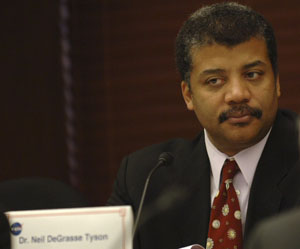Neil deGrasse Tyson’s Broad Vision
Tyson is capable of casting his net well beyond the field of astronomy

Noted astrophysicist Neil deGrasse Tyson, famous for popularizing science in the tradition of Carl Sagan, was in the nation's capital yesterday, where he spoke with aerospace journalists at a Space Foundation breakfast. For 13 years, Tyson has been the director of the Hayden Planetarium at the American Museum of Natural History in New York. He currently hosts "NOVA Science NOW," and has just written a book, The Pluto Files, chronicling his experience supporting the downgrade of Pluto from full planet status to dwarf planet. Tyson is capable of casting his net well beyond the field of astronomy, and presented three "drivers" that compel nations to do grand things, such as mounting the Apollo program, funding the voyages of Columbus and Magellan, or building the Pyramids. These are:
1. The war driver, or more broadly, the urge to avoid death—"There's always money to fight a war," he says. That can include a war on disease. Apollo, he reminded the room, was a battle in the Cold War. Without that "war," Kennedy would have had no rationale for spending the money on the lunar program.
2. The wealth driver. Tyson claims the powers that be in Italy hundreds of years ago were spending their money building cathedrals, so Columbus went to the Spanish crown and got the needed financing for his voyages. "Today," says Tyson, "40 countries have Spanish as their primary language, while Italy has two or so, which includes the Vatican." The great naval voyages, including those of Magellan and Cook, were hugely expensive for their day, and "the person writing the checks didn't give a rat's about the exploration." Soon after Cook's voyages, he says, the British Empire took hold throughout the Pacific.
3. Praise of royalty and deity driver: the Pyramids at Giza, the European cathedrals, etc. But this third category, he warns, isn't happening much anymore.
So, if we want to go to Mars, he says, it'll have to be driven by #1 or #2. And say what you will about new enterprises like Virgin Galactic that will shoot rich tourists sky-high on brief, parabolic flights above the atmosphere for a few minutes; Tyson laments that commercial space flight is still sputtering compared to how commercial aviation took off.
He thumbs his nose at the definition of space as 100 kilometers high, about 62 miles. Sure, he says, that number is a nice round one that marks the region where there's no longer enough atmosphere to scatter the stars—"where daytime becomes nighttime," he says. "But that means that 'in space' is simply a function of how thick your atmosphere is. What about Mars, where the atmosphere is much thinner?" Or the surface of the moon, where there's no atmosphere? "How about Earth orbit? Now you're talking. That's half the energy required to go anywhere in the solar system."
Ultimately, he reasons, progress flows out of the critical mass of scientists and engineers in a society. Combined with the right "ambition driver"—say, the need to protect the Earth from an incoming asteroid—this collective mental resource will be critical. "And I know of no force of nature as powerful as that of NASA. There are no eighth graders saying 'I want to work for NSF (National Science Foundation) or NIH (National Institutes of Health).' It's NASA." He asserts that the $100 billion space station costs a mere 6/10 of a penny of each tax dollar, which is an example of how the visibility and benefit to NASA are many times greater per tax dollar than that of any other government agency. And he adds that "the government can do things for which there are no capital markets to support, such as going to the moon. But the ooh-ahh space program died in the 1980s."
A Mars voyage would not be an end in itself, Tyson says, but a stepping stone. It will be very exciting all the same, he believes, like Apollo all over again. The first crew to be assigned to a Mars landing will have the press delving into their childhoods, obsessed with the exploration aspect of the mission. And therein lies one of Tyson's main points—the goal itself should be a very well communicated sense of exploration. Only then can we move on to something greater than Apollo. And he hopes he's around when that happens. "My greatest regret about dying," he muses, "will be that I won't get to see what came after I died."